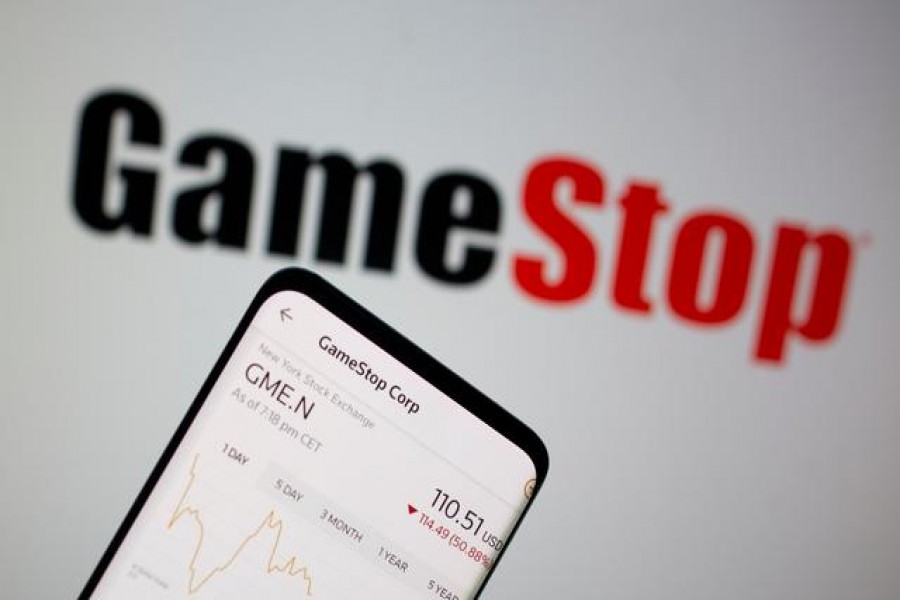Shares of GameStop and other companies caught in the recent social media-fueled trading frenzy bounced on Friday, after online broker Robinhood lifted all the buying curbs imposed at the apex of the battle between amateur investors and Wall Street hedge funds.
The videogame retailer, the initial trigger for the market slugfest after gaining popularity on social media platform Reddit’s WallStreetBets, closed up 19.20 per cent at $63.77 after hitting a session high of $95, although the wild gyrations seen in the past two weeks appeared to be easing.
“The WallStreetBets influence is diminishing to a certain extent because there are a lot of people that got burned,” said Dennis Dick, head of markets structure and a proprietary trader at Bright Trading LLC in Las Vegas.
“From a short seller’s perspective, I was spooked a week-and-a-half ago to short any small caps because I was worried WallStreetBets could squeeze me on it,” Dick said. “I’m not spooked anymore; I kind of went back to normal trading, so I can say I think the WallStreetBets influence is not as strong as it was last week.”
Robinhood, among the fee-free online brokers credited with fueling the trades, said late on Thursday it had removed all buying restrictions imposed due to a surge in clearinghouse deposit requirements last week, reports Reuters.
With many of the stocks involved in the so-called “Reddit rally” slumping this week, hedge funds with bearish positions on GameStop made $3.6 billion in profits compared with losses of $12.5 billion in January, financial analytics firm Ortex said on Friday.
The slump cut declines so far this year for GameStop shorts to $8.73 billion realised and unrealised losses through Friday morning, according to analytics firm S3 Partners.
Analysts pointed to a stunning Hong Kong debut for Tencent-backed Kuaishou Technology as more evidence of the growing power of small investors, but on the WallStreetBets forum at the centre of the last week’s action there were few signs of consensus around new stock market favourites.
“The speculation is now fading, but that doesn’t mean it can’t come back a month or two months from now,” said Peter Cardillo, chief market economist at Spartan Capital Securities in New York.
“A lot of the small investors may have gotten burnt, so it’s going to take time to heal that wound,” Cardillo said. “It may not pop up in those stocks that were already attacked, but it could happen in other companies and maybe on a broader scale.”
Other stocks that have seen sharp declines as their fortunes reversed in the social media phenomenon, such as Koss Corp and the US-listed shares of Blackberry closed higher on Friday, while others such as Bed, Bath & Beyond, saw their price fall slow.
US Treasury Secretary Janet Yellen met with top officials on Thursday to discuss the volatility, and sources told Reuters securities regulators were looking at all aspects of the rally and all parties involved.
GameStop’s stock has crashed to as low as $51.09 after scaling as high as $483 last week, but is still up about 220 per cent from levels at the start of the rally in mid-January. Shares of cinema operator AMC Entertainment have more than halved from a closing peak of $19.90 and closed down 3.67 per cent on Friday.
Shares of insurer Clover Health, which on Thursday became the first company to be targeted by a short-selling report in weeks, rose 5.7 per cent due to a late rally sparked by comments from venture capitalist backer Chamath Palihapitiya in response. The company earlier said on Friday it had received a letter from the Securities and Exchange Commission following the report published by Hindenburg Research.
Meanwhile, on WallStreetBets, participants were still urging investors to stick with GameStop.
“GME YOLO/FOMO my second mortgage. 35k to 5mil to 300k. I WILL NOT SELL!,” read one post by a participant with the handle u/Rhollow1.


